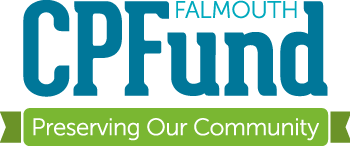Community Preservation Act Began on Cape Cod
The Community Preservation Fund
59 Town Hall Square
Falmouth, Mass 02540
Tel: 508-495-7436
Fax: 508-457-2511
Email: cpfund@falmouthma.gov
By Eric Turkington
The Community Preservation Fund may be ten years old in Falmouth in 2015, but its roots actually began twenty years before that. And that part of its history, too, began in Falmouth.
It all began in 1985, with The 300 committee, and its goal of acquiring 300 acres for the town’s 300th anniversary. Preserving open space turned out to be wildly successful – in ten years the town’s voters only rejected one proposed acquisition -- but the process was cumbersome – each parcel required a 2/3 town meeting vote and a Proposition 2 ½ override at the ballot.
Other Cape towns were encountering the same problem, and in 1994 a group from across the Cape got together to advocate for a better way of buying land for protected open space.
What we came up with was the Cape Cod Land Bank. That effort began with a non-binding referendum in all fifteen Cape towns in 1995 – asking, would people support a town land acquisition program funded by a 1 percent deeds excise tax? The vote was a solid “yes.”
Armed with that, we went to the Legislature. Overriding Governor Cellucci’s veto and the strong opposition of the real estate lobby, we got the Cape Cod Land Bank passed – but not before the opponents had succeeded in amending the bill with a poison pill – making the seller pay the 1 percent deeds excise tax, not the buyer.
It went to the ballot in a Capewide special election in early 1998. The Realtors campaigned against the Land Bank. They ran radio and print ads portraying old folks unable to afford retirement because they had to pay a deed excise tax. They said they were all for a land bank, just not one funded this way. And they won.
So after the election, we went to them and said – OK, if you’re really for a land bank, how about funding it with a property tax surcharge – an idea they themselves had put on the table in earlier negotiations? After some internal debate, they agreed, and together with the Realtors we went back to the legislature with a new funding plan – a 3 percent property tax surcharge, solely for open space protection. To sweeten the offer, the state offered a $15 million match. We went to the ballot with that plan in November 1998, and it won in all fifteen Cape towns.
What’s this got to do with the Community Preservation Act? Everything.
Senator Bob Durand had been trying for years to get a Community Preservation Act, for open space, community housing, and historic preservation, through the legislature, with no success.
What he saw working on Cape Cod was a formula that both the legislature and town voters would support: a surcharge on the local property tax, voted at the ballot box, with a state match, and a local appointed committee, making recommendations to town meeting.
In the House, Speaker Tom Finneran had been key to the Land Bank’s success, and as negotiations around the Community Preservation Act progressed, the negotiators would go to him and he always would say, “make it like the Cape Cod Land Bank.”
They did, and so in 2000 the Community Preservation Act, modeled after the Cape Cod Land Bank, became law.
At the same time the Cape’s Land Bank committees had done exactly what we wanted them to do – buy as much land as quickly as possible, and bond over twenty years to pay for it. In the end, they bought over 4,500 acres for $150 million. So by 2003 most Cape towns had committed most of their land bank property tax revenue streams to paying the interest and principal on those bonds.
In its first several years, the Community Preservation Act had relatively few communities involved and so the yearly state match was 100 percent – dollar for dollar. And they were looking for communities to join in. Senator Rob O’Leary and I and others in the Cape delegation looked to see how we could make this work for Cape Cod.
To his great credit, Rob negotiated the deal of the century for Cape Cod towns –they could join the CPA, convert their 3 percent land bank surcharge – money they had, for all practical purposes, already spent - to a CPA surcharge, and be eligible for the CPA matching funds. This was the greatest no brainer in the history of earth, and in 2005 Falmouth, and every Cape town, voted to join the CPA.
The happy result? In the ten years since Community Preservation Act matching money started flowing to Falmouth, the town has received almost $12 million for expenditure on open space, community housing, historic preservation, and more recently, recreation. By way of comparison the town received $13.7 million in local aid from the state in that same time period.
At a time when Cape towns often complain about being shortchanged by the state funding formulas, the Community Preservation Act is one very happy exception.
And it is worth remembering, it all began here on Cape Cod.
